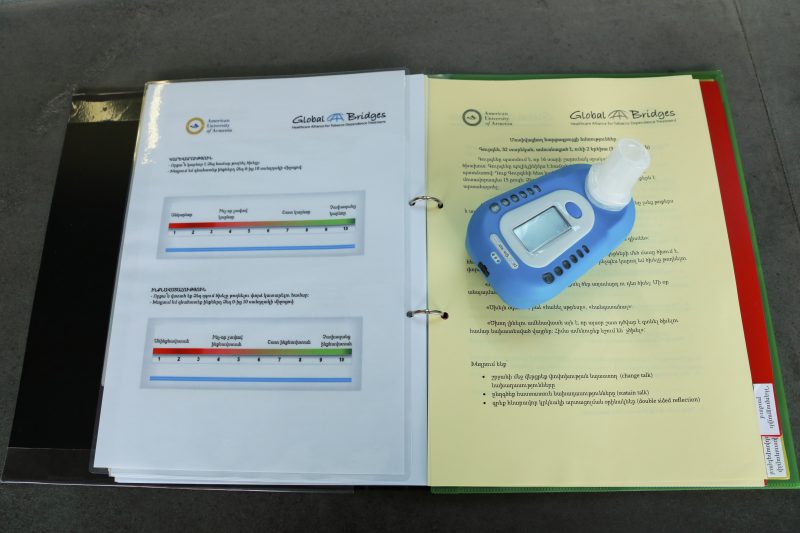
Implementing WHO Framework Convention on Tobacco Control Article 14 through Advocacy and Trainings
3 min readIn 2014, the American University of Armenia (AUA) School of Public Health (SPH) was one of the 19 organizations worldwide that was competitively awarded the 2-year grant to expand the work in the field of tobacco dependence treatment. The grant was presented by Global Bridges Healthcare Alliance for Tobacco Dependence Treatment and hosted by the Mayo Clinic and Pfizer Independent Grants for Learning & Change (IGLC) and aimed to develop national capacity in implementing the World Health Organization (WHO) Framework Convention on Tobacco Control (FCTC) Article 14 in Armenia (view the project poster here).
The SPH envisioned development of the national capacity in implementation of best practices for the tobacco dependence treatment in Armenia through development of a smoking cessation training program for practicing primary healthcare physicians in Armenia. The application of the existing best practices in a transition country such as Armenia required a careful examination and a thorough adjustment of the approaches to the local context. This necessitated a formative research during development of the training course, such as 1) qualitative research with future beneficiaries to clarify their knowledge, attitude and practices regarding smoking cessation, their perceived needs for training and support for addressing tobacco use among their adult patients in Armenia (the full report is available here), as well as 2) pharmaceutical market research to determine availability, affordability, and prices of the smoking cessation drugs (the full report is available here). The results of the formative research indicated an urgent need to enhance Armenian physicians’ knowledge and skills in smoking cessation and to ensure wide accessibility, availability, and affordability of smoking cessation products in Armenia.
To arm physicians with evidence-based smoking cessation counseling and treatment knowledge and skills the SPH research team developed the first smoking cessation training program for practicing primary healthcare physicians in Armenia. All the training materials were developed based on evidence-based international resources and were adapted to the local context using the findings of the formative research. The Ministry of Health accredited the training curriculum and designated five continuing medical education (CME) credits. Overall, 58 primary healthcare physicians (family physicians and general therapists) from 18 polyclinics in Yerevan and Gyumri participated in the series of evidence-based tobacco dependence treatment trainings.
The research team utilized several measurements to evaluate the effectiveness of the trainings including a training expectation survey, pre- and post-training quizzes and knowledge, attitude, and practice (KAP) surveys that were administered before the training and at 4-months follow-up. The KAP survey was also completed by 51 primary healthcare physicians that did not participate in the trainings and were involved in the study as the control group (48 completed both baseline and follow-up surveys). The results of the evaluation demonstrated high satisfaction with the content, design and delivery process of the trainings, as well as significant improvement in physicians’ knowledge and self-reported practice in tobacco dependence treatment four months after participation in the trainings. At the end of the study, the control group participants received all the training materials (n=49) and were also invited to participate in tobacco dependence treatment seminars (shorter version of the training). Overall, 37 primary healthcare physicians from 8 polyclinics in Yerevan and Gyumri participated in these seminars.
Dr. Arusyak Harutyunyan, the Principal Investigator of the project highlighted: “Through successful implementation of this project we were able to build smoking cessation training capacity on evidence-based methods and tools for teaching physicians the basic skills for working with smokers and designed, implemented and evaluated the smoking cessation training program for practicing primary healthcare physicians in Armenia. We need to continue our work towards further strengthening the support from key stakeholders, including the policy and decision making community and the institutions of medical education to sustain the project outcomes and advocate for a system-wide change in implementation of physicians’ tobacco dependence treatment trainings.”
The project was successfully implemented in collaborative partnership with the National Institute of Health (NIH), Yerevan State Medical University (YSMU), and Yerevan and Gyumri Municipalities.
The project findings were widely disseminated in local and international communities through different meetings, discussions, AUA and Global Bridges websites, webinars, grantee calls as well as publications and presentations in different international scientific conferences.



